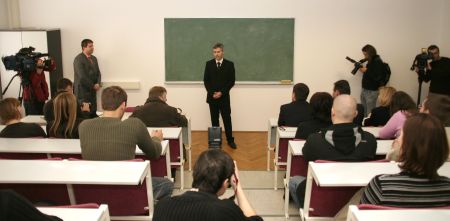Today, 2 March 2009, the acting Director General of the Police Janko Goršek, his Deputy Tatjana Bobnar, M.A., the Director of the Criminal Police Directorate at the General Police Directorate (GPD) Aleksander Jevšek, M.A., and the Director of the Police Academy Franc Kosmač, M.A., officially opened the 2009 Criminal Training Course at the Faculty of Criminal Justice and Security.
The criminal investigation course, jointly organised and implemented by the Criminal Police Directorate and the Police Academy will last until 19 June 2009. The theoretical part of the course will be attended by 28 participants from individual Police Directorates, the Criminal Police Directorate and the Forensic Science Centre at the GPD. The practical part will, in addition to the above, be attended by another 27 participants who have been put forward for this part of the course by individual Police Directorates.
 From left to right: Janko Goršek, Tatjana Bobnar, Aleksander Jevšek and Franc Kosmač
From left to right: Janko Goršek, Tatjana Bobnar, Aleksander Jevšek and Franc Kosmač
Professionally, this is the most important training programme for criminal investigations. At the start of their careers, the course helps criminal investigators acquire basic skills and to independently carry out their profession. Later, they receive additional training at more specialised courses, where they obtain the required specialist skills for working in individual areas of crime investigation.
The criminal investigation course is divided into a theoretical part, taking place in Ljubljana, and a practical part, which will be held at the Gotenica Supply Centre. Lectures on the theoretical part will be given by experts from the police and external institutions, whilst the practical part will be led by criminal police instructors. The content of the criminal investigation course is amended each year in response to the needs dictated by practical work and the current situation in the area of crime investigation.

During the 12-day practical part, participants acquire practical knowledge and skills for the detection and investigation of crime (such as the skills necessary for driving in special conditions and for carrying out practical procedures; the investigation of a railway accident site; the investigation of an armed robbery, suicide, accident or of a suspicious death; the use of a helicopter in criminal investigations; inspection of an explosion or arson site, etc.).
Among those attending the theoretical part of the course there are seventeen women, which represents 60.7% of all attendees. Most participants have either higher or university education, most frequently in the area of criminal justice and security. Seven attendees are already employed in the area of economic crime.

